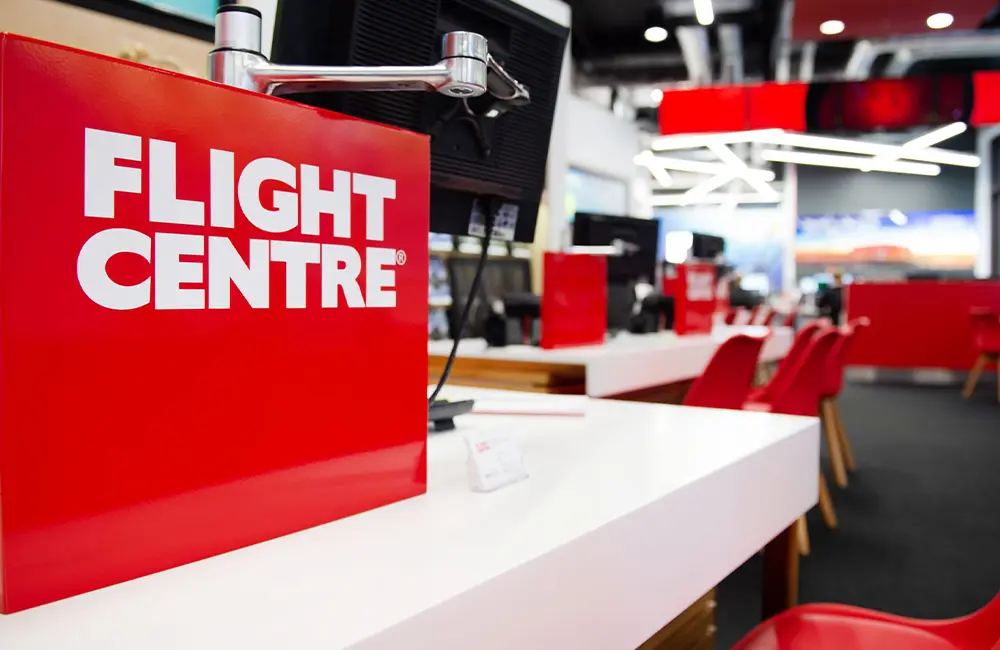Flight Centre Travel Group (FCTG) took a 20% hit to its share price last Friday after releasing Q1 2024 financial results that missed market expectations. So, what happened? And what does this mean for the outlook ahead?
Flight Centre Travel Group’s (FLT) stock closed to a near two-year low at $17.20 on Friday, wiping an estimated $1 billion off its share value. FCTG’s dramatic share price drop came as a surprise for Australia’s largest travel company, particularly given the record performance and forward outlook it showcased at the end of the 2023/24 financial year.
FCTG’s Q1 2024 report revealed revenue growth of 5% year-on-year, but the result fell short of the 7-8% growth forecasted by analysts. The company attributed this underperformance to month-to-month inconsistencies and softer-than-expected leisure travel demand in key markets, including Australia, the UK, and the United States.
Adding to the challenges, FCTG said rising operational costs—including fuel prices and wages—also squeezed profit margins, with profit before tax down 12% from Q1 2023, falling to AUD $72 million.
The integration of the UK luxury travel company Scott Dunn, which Flight Centre acquired in 2023, also incurred higher-than-expected costs, impacting the bottom line.
Nervous investors fearing a cooling aviation sector also caused Corporate Travel Management’s (CTD) stock to fall 9.5% to $11.33 at the close on Friday.
Web Travel Group Limited (WEB) shares also fell a further 4% on Friday to $4.20, dropping 36% in total this month due to lower margin expectations. The sudden collapse of Europe’s third-largest tour operator, FTI Group, in Germany has also severely impacted Web Travel’s earnings and future projections.
International airfares coming down, domestic airfares going up
While it may not be good news for airlines or financial analysts, most other areas of the industry welcome the continuing fall in international airfares. Flight Centre’s corporate division, FCM, reported last week that the average cost of seats across all carriers has recently dropped by as much as 10%.
FCM found that economy fares dropped by five to 10% in the most recent quarter (July to September 2024) compared to the previous year. That’s the equivalent of over $100 per ticket, FCM said, with the most significant drops for Qatar, UAE, France, UK and Italy.
Meanwhile, business class fares also fell by 4%—or more than $300—over the same period.
The less-than-positive news is that while international fares fell, the FCTG brand revealed that domestic airfares grew in Q3 (year-on-year) by 3 to 5%—equal to an average $10-20 increase per ticket.
What lies ahead?

Consumer sentiment remains a critical factor shaping the travel industry in 2025. As we explored in our recent report on consumer travel trends, the cost of living crisis and stalled interest rate cuts are leading some consumers to continue tightening their spending.
As the travel industry continues to recalibrate after a two-year boom, geopolitical uncertainties—such as the looming U.S. election, the Middle East crisis, and the war in Ukraine could also create volatility that may impact the sector.
However, based on what we do know, travel remains resilient, often defying broader market sentiment. Barring any unforeseen ‘Black Swan’ events, the 2025 outlook remains positive, with solid demand and recovery continuing across key markets.
There are especially encouraging signs on the corporate travel side, with indicators suggesting that business travel could rebound further as economic conditions stabilise.
Flight Centre Corporate Global COO Melissa Elf said that corporate travel is also crucial for winning business, attending events, and retaining staff, and companies are increasing their travel budgets.
“Our customers have told us that 40 per cent of businesses plan to increase their travel this financial year, while 42 per cent of customers intend to increase their travel spend.”
Despite its disappointing Q1 results, Flight Centre remains focused on its long-term growth strategy. The company says it plans to reduce costs by reducing its global retail footprint and shifting resources towards digital sales. Additionally, FCTG emphasised that the luxury travel segment, bolstered by the Scott Dunn acquisition and Ignite-powered Aldi Holidays, presents a significant growth opportunity.
FCTG noted, too, that it is expecting ‘normal industry growth’ over the full financial year, with two-thirds of the company’s profit expected to be heavily weighted in the second half of the financial year and 4-5% growth in Australian outbound travel, as previously forecasted. More market guidance will be given at its Annual General Meeting on November 14, 2024.
A mere blip on the radar?
As FCTG CEO Skroo Turner summarised in his comments, “We are investing in our future—technology, people, and the evolving landscape of travel. While 2025 presents some challenges, we are confident in our ability to adapt and grow.”






